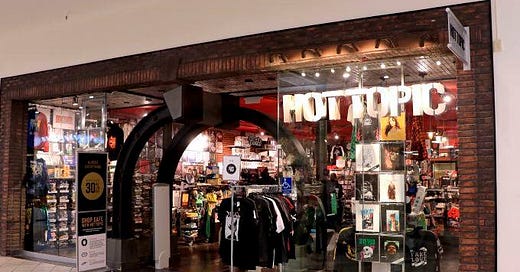Fashion Retail Workers Are Pushing Back Against Low Wages
"You cannot pay your workers in passion," read a note left by Hot Topic employees.

Late last week, a photo of a sign on the door of a Minnesota Hot Topic store went viral on Twitter. The white piece of paper had a printed message for customers. "Almost all of our staff walked out due to the inability of the Hot Topic Company to support and give a living wage," the sign said. "We cannot support ourselves and our families. We have worked so hard and cannot do this any longer. You cannot pay your workers in passion. Sorry for the inconvenience."
It’s a familiar sentiment that has been happening at stores and restaurants around the country in the last year. Workers are walking out of their jobs at some of the world’s most successful companies because they are not able to pay bills with current wages. What is particularly poignant in the note left by employees at Hot Topic, however, was that the employees felt that the store was trying to pay them “in passion.” This idea is something that reverberates throughout the fashion industry. Often corporations try to make you feel that because you like clothing or a particular brand, just being associated with them should make you grateful for what you get. Where you work is not a personality trait, but in fashion, from retail to corporate to media, it’s a tactic used to take advantage of workers.
Retail employees are working unpredictable shifts throughout the week with an average national pay of $26,520 per year (this is for all retail sales workers, not just fashion) — well below a living wage in the United States. And if for some reason, you have the idea that retail is an easy job that doesn’t deserve more than the bare minimum of pay and benefits, just ask any one retail worker what it's been like to work in 2020. Not only are they dealing with the regular tasks of their role, they also have to implement mandates on masks and vaccines to sometimes unruly customers.
Workers are claiming they cannot pay their bills while the company they work for is bringing in millions in profits. Hot Topic, for example, made $400 million in 2020 and is often poised as the mall brand that beat the odds in the retail apocalypse. As The New York Times put it in 2019, “Hot Topic Is Still Hot.”
Despite the ever growing and evolving e-commerce segment in fashion, brick-and-mortar retail is still a necessary business model. When the Coronavirus pandemic shut down major retail stores, the narrative was that a pivot to online business would be the future of shopping. However, according to Forbes, annual sales in store retail have actually grown at a steadier rate than e-commerce. For brands like Hot Topic, which are famously an in-store mall brand experience (you know exactly what it feels like to be inside one of their stores), the retail experience is crucial to its continued success.
It’s not that people don’t want to work, it’s that people want dignity and fair wages. While fashion is notoriously bad at that, the shift in workers rights appears to be reaching the industry at every level.



